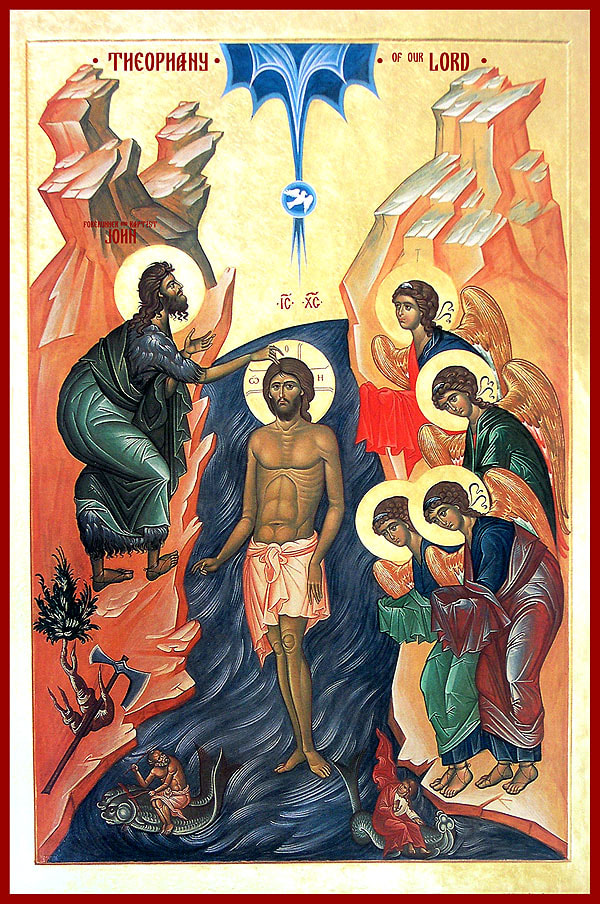Then Jesus came from Galilee to John at the Jordan, to be baptized by him. John would have prevented him, saying, ‘I need to be baptized by you, and do you come to me?’ But Jesus answered him, ‘Let it be so now; for it is proper for us in this way to fulfil all righteousness.’
The baptism of Jesus by John the Baptizer is recorded by Matthew, Mark, and Luke, but only Matthew records John's attempted refusal. In fact, in the other versions of the story, it doesn't seem that anyone in the crowd (including John) knows who Jesus is until after the baptism happens. But here John has been granted special knowledge of Jesus and demurs, saying--correctly!--that he, John, is the one who should be baptized by Jesus. Jesus gives an interesting reply: "it is proper for us in this way to fulfill all righteousness." Jesus needs no repentance or forgiveness of sins, but he submits to the baptism of John so that no sign of righteousness may be lacking in him. This is a theme in Jesus's life. While sometimes carelessly depicted as a renegade or rebel, Jesus in the Gospels is very often patient and accommodating. As an infant he is circumcised according to the Law of Moses and is presented in the Temple with the customary sacrifice (Luke 2:21-40). He argues over the meaning of the Sabbath laws, but he never rejects them. He leads a (maybe violent!) protest at the Temple to drive away merchants who profit by the sacrifices but doesn't tell anyone to boycott it.
For Jesus, whom we confess to have been without sin and in need of no grace, every such ritual action is a sign to illuminate us. Orthodox Christians celebrate the baptism of Jesus on what we call Epiphany but that they more often call "Theophany," a manifestation of God. Jesus submits to baptism in order to be revealed. The one who stretched the oceans submits to being washed in the river. He humbles himself, in other words, and in doing so makes himself visible to the eyes of faith.
The story from Acts takes place years later, after Jesus has ascended to heaven and the Holy Spirit has come to lead the disciples out into the world. Peter has been led to the home of a Gentile soldier, Cornelius, and the Spirit provokes him to say something dramatic:
Then Peter began to speak to them: ‘I truly understand that God shows no partiality, but in every nation anyone who fears him and does what is right is acceptable to him. You know the message he sent to the people of Israel, preaching peace by Jesus Christ—he is Lord of all.
That's how I take it, anyway. The meeting of Peter and Cornelius is a powerful moment. Cornelius is an "insider" in the Roman imperial system, a soldier and (presumably) citizen in the power that dominates the people and land in and around Israel. Yet he is an "outsider" with respect to the promises of God through Moses and the Prophets, which were sent specifically to the people of Israel. Peter, on the other hand, is an "outsider" in the Roman system (tradition holds that he was crucified, as only non-citizens could be), a Jewish man in a Gentile empire that did whatever it pleased with him and his people. Yet he was an "insider" with respect to the promises of God.
This doubleness--both of them inside and outside, in opposite ways--means that Peter is realizing something even as he preaches good news to Cornelius and his household. Peter understands that God has already been at work outside of the boundaries of the covenant (and the church!) and his definition of his own community shifts.
This Sunday is a time especially suited to remembering and renewing our baptismal vows and promises. So at the end of the sermon we'll be doing that, reaffirming the promises we made (or that were made on our behalf) at our baptism and being reminded of the promises God attaches to that baptism: forgiveness of sins, union with the Body of Christ, and eternal life. This involves being splashed with water from the baptismal font, so be advised: we're all going to get a little wet. And it's a good time to remember that through this sacrament we are joined to all kinds of people in a new creation that transcends every nation, language, time, and place.


 RSS Feed
RSS Feed